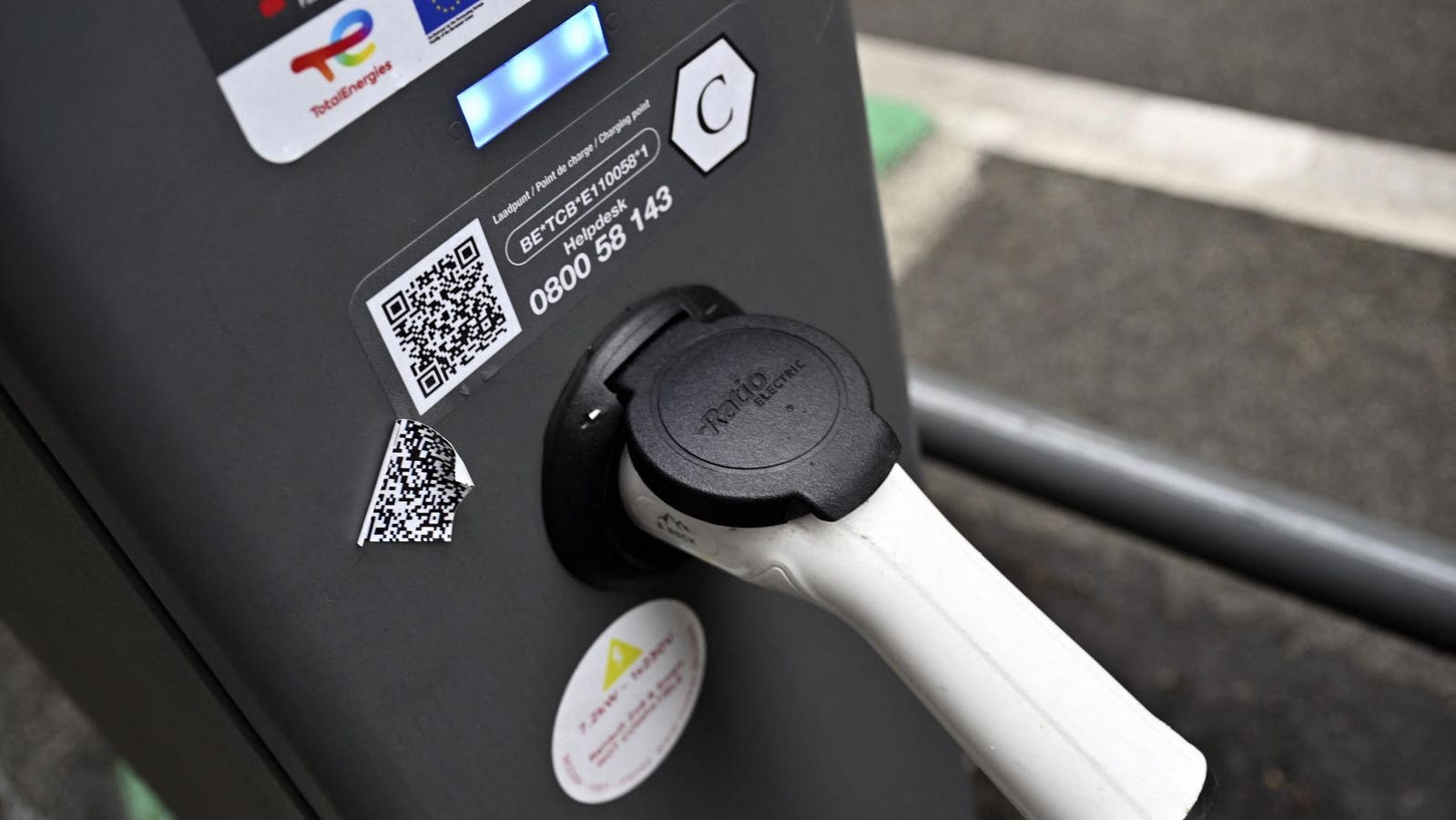Fintech
We need a plan to eliminate QR codes in fintech

A fake sticker pictured at an electric car charging station in the center of Brussels, Wednesday 15 … [+] May 2024. There are payment fraud attempts using stickers with a QR code that links to a website rather than the correct payment method. BELGIAN PHOTO ERIC LALMAND (Photo by ERIC LALMAND / BELGA MAG / Belgian via AFP) (Photo by ERIC LALMAND/BELGA MAG/AFP via Getty Images)
BELGA MAG/AFP via Getty Images
Earlier this year the Federal Trade Commission (FTC) issued a warning on the “growing abuse” of QR codes and it is certainly true that QR crime is growing. So, given that today is the 50th anniversary of the first barcode transaction, perhaps we should start thinking about what comes next.
Golden anniversary
Yes, it was fifty years ago today, June 26th 1974that the first pass of the standard black and white stripes of the universal product code (UPC). barcode It happened at a Marsh supermarket in Troy, Ohio. (It was, incidentally, a 67-cent pack of Wrigley’s Juicy Fruit gum.)
Twenty years later, in 1994, Mr. Masahiro Hara had grown tired of having to scan six or seven bar codes on every box of parts that whizzed past him on the assembly line of the Toyota auto parts factory where he worked. He couldn’t help but wonder why they were still using the limited-capacity barcodes of the 1970s, when there was so much data to read. After studying a game of Go, he invented the two-dimensional barcodes which we now know as QR code.
QR is everywhere, always.
© Helen Holmes (2021).
Twenty years later 2014QR codes were being used for all sorts of things and Mr Hara was awarded the “People’s Prize” from the European Inventor Awards, at which point he said that QR codes would probably only last about a decade before they were replaced by something more sophisticated.
Well, they weren’t, and here we are. 2024and QR codes are everywhere.
They are cheap, simple and convenient. But they have a big problem. Fraud.
(This is not a new problem, by the way. Ten years ago I wrote that one of the problems with QR codes is that they are not secure. A few years later I wrote an article pointing out that contactless should be more secure than QR codes because the relevant standards included the ability to digitally sign tags, although I also noted that no one was using this, while anyone could easily create fake QR codes.)
The problem of fraud emerged as soon as QR codes entered the mass consumer market all over the world. I remember reading in the South China Morning Post that in March 2017, around 90 million yuan was stolen via QR code scams in Guangdong alone: in one case, a suspect was found to have replaced merchants’ legitimate barcodes with fake codes that they embedded a virus to steal personal information, and that across China, a quarter of viruses and Trojans came via QR, so I knew it was only a matter of time before we started seeing the same problems everywhere.
Criminals are using QR codes for fraud both online and offline. In China, scammers have been caught placing fake parking tickets – complete with QR codes for easy mobile fine payment – on parked cars. In the Netherlands, a QR code scam exploited a legitimate feature within a mobile banking app to defraud bank customers. In Germany, fake emails containing QR codes have lured eBanking customers to malicious websites under the guise of reviewing their account privacy policy updates. In Belgium (see photo above) they are being used to trick people using electric car charging stations. In the US (and UK), criminals have been particularly active in car parks, pasting stickers with malicious QR codes on parking attendants and tricking drivers into entering their bank account or credit card details into a fake phishing site.
It’s time for alternatives
So while QR codes are indeed convenient for payments and more, they pose serious security risks, such as directing users to malicious websites or triggering unwanted actions. What should we use instead?
Contactless is a good choice for some things. Sitting at a restaurant table, tapping instead of scanning. Near-Field Communication (NFC) technology enables fast and secure close-range communication between devices, and unlike QR codes, which can be scanned from a distance, NFC requires proximity, offering an added layer of security. NFC tags can be embedded in various objects and are increasingly used for contactless payments and access control, and the chips in these tags can support very sophisticated security measures.
There are also other long-range wireless options, such as Bluetooth Low Energy (BLE) and Ultra Wide Band (UWB) that could also be used to send information to a consumer device, and it would be relatively simple to add encryption and digital signatures so that phones they may reject bogus connections.
In the long run, one could imagine that digital watermarks embedded in images or videos could be used to convey information. These are less visible and more difficult to tamper with than QR codes.
A little further down the line, though, we could find ourselves using smart glasses that can recognize what we’re looking at and offer a selection of appropriate options: if I’m looking at a poster advertising an upcoming Hawkwind concert on the tube, then lo and behold, I wouldn’t need to scan a QR code because my smart glasses should be able to read the poster and automatically go online to the relevant booking site. From there, it’s a short step to augmented reality (AR), where the infrastructure itself adds interactivity and security, allowing users to interact with dynamic content that’s harder to replicate or maliciously alter.
Fintech Priority
That’s actually where Mr. Hara thought we would be in 2024. As I write this I am sitting in a train carriage and there is an advertisement for some form of fast food on the back wall. The advertisement shows a QR code. But surely a smartphone (as Mr. Hara reasoned) should be able to read advertising and give me the ability to see where the nearest store is or what today’s specials are. My iPhone already knows how to recognize text, it wouldn’t seem that difficult to get it to automatically extract URLs and display them so you can see where you’re going.
As these technologies mature, they are likely to become more widespread and potentially replace or augment QR codes primarily in applications where greater security is required, such as payments and other financial services. While QR codes are likely to remain in use in many cases due to their familiarity and ease of implementation, we in the fintech world should really plan on implementing more secure alternatives as a priority.
Fintech
Lloyds and Nationwide invest in Scottish fintech AI Aveni

Lloyds Banking Group and Nationwide have joined an £11m Series A funding round in Scottish artificial intelligence fintech Aveni.
The investment is led by Puma Private Equity with additional participation from Par Equity.
Aveni creates AI products specifically designed to streamline workflows in the financial services industry by analyzing documents and meetings across a range of operational functions, with a focus on financial advisory services and consumer compliance.
The cash injection will help fund the development of a new product, FinLLM, a large-scale language model created specifically for the financial sector in partnership with Lloyds and Nationwide.
Joseph Twigg, CEO of Aveni, explains: “The financial services industry doesn’t need AI models that can quote Shakespeare, it needs AI models that offer transparency, trust and, most importantly, fairness. The way to achieve this is to develop small, highly tuned language models, trained on financial services data, vetted by financial services experts for specific financial services use cases.
“FinLLM’s goal is to set a new standard for the controlled, responsible and ethical adoption of generative AI, outperforming all other generic models in our selected financial services use cases.”
Robin Scher, head of fintech investment at Lloyds Banking Group, says the development programme offers a “massive opportunity” for the financial services industry by streamlining operations and improving customer experience.
“We look forward to supporting Aveni’s growth as we invest in their vision of developing FinLLM together with partners. Our collaboration aims to establish Aveni as a forerunner in AI adoption in the industry, while maintaining a focus on responsible use and customer centricity,” he said.
Fintech
Fairexpay: Risk consultancy White Matter Advisory acquires 90% stake in fintech Fairexpay

Treasury Risk Consulting Firm White Matter Alert On Monday he announced the acquisition of a 90% stake in the fintech startup Fair payment for an undisclosed amount. The acquisition will help White Matter Advisory expand its portfolio in the area of cross-border remittance and fundraising services, a statement said. White Matter Advisory, which operates under the name SaveDesk (White Matter Advisory India Pvt Ltd), is engaged in the treasury risk advisory business. It oversees funds under management (FUM) totaling $8 billion, offering advisory services to a wide range of clients.
Improve your technology skills with high-value skills courses
| IIT Delhi | Data Science and Machine Learning Certificate Program | Visit |
| Indian School of Economics | ISB Product Management | Visit |
| MIT xPRO | MIT Technology Leadership and Innovation | Visit |
White Matter Advisory, based in Bangalore, helps companies navigate the complexities of treasury and risk management.
Fairexpay, authorised by the Reserve Bank of India (RBI) under Cohort 2 of the Liberalised Remittance Scheme (LRS) Regulatory Sandbox, boasts features such as best-in-class exchange rates, 24-hour processing times and full security compliance.
“With this acquisition, White Matter Advisory will leverage Fairexpay’s advanced technology platform and regulatory approvals to enhance its services to its clients,” the release reads.
The integration of Fairexpay’s capabilities should provide White Matter Advisory with a competitive advantage in the cross-border remittance and fundraising market, he added.
The release also states that by integrating Fairexpay’s advanced technology, White Matter Advisory aims to offer seamless and convenient cross-border payment solutions, providing customers with secure options for international money transfers.
Fintech
Rakuten Delays FinTech Business Reorganization to 2025

Rakuten (Japan:4755) has released an update.
Rakuten Group, Inc. and Rakuten Bank, Ltd. announced a delay in the reorganization of Rakuten’s FinTech Business, moving the target date from October 2024 to January 2025. The delay is to allow for a more comprehensive review, taking into account regulatory, shareholder interests and the group’s optimal structure for growth. There are no anticipated changes to Rakuten Bank’s reorganization objectives, structure or listing status outside of the revised timeline.
For more insights on JP:4755 stock, check out TipRanks Stock Analysis Page.
Fintech
White Matter Advisory Acquires 90% Stake in Fintech Startup Fairexpay

You are reading Entrepreneur India, an international franchise of Entrepreneur Media.
White Matter Advisory, which operates under the name SaveDesk in India, has announced that it is acquiring a 90% stake in fintech startup Fairexpay for an undisclosed amount.
This strategic move aims to strengthen White Matter Advisory’s portfolio in cross-border remittance and fundraising services.
By integrating Fairexpay’s advanced technology, White Matter Advisory aims to offer seamless and convenient cross-border payment solutions, providing customers with secure options for international money transfers.
White Matter Advisory, known for its treasury risk advisory services, manages funds under management (FUM) totaling USD 8 billion.
Founded by Bhaskar Saravana, Saurabh Jain, Kranthi Reddy and Piuesh Daga, White Matter Advisory helps companies effectively manage the complexities of treasury and risk management.
The SaveDesk platform offering includes a SaaS-based FX market data platform with real-time feeds for over 100 currencies, bank cost optimization services, customized treasury risk management solutions, and compliance guidance for the Foreign Exchange Management Act (FEMA) and other trade regulations.
Fairexpay is a global aggregation platform offering competitive currency exchange rates from numerous exchange partners worldwide. Catering to both private and corporate customers, Fairexpay provides seamless money transfer solutions for education, travel and immigration, as well as simplifying cross-border payments via API and white-label solutions for businesses. Key features include competitive currency exchange rates, 24-hour processing times, extensive currency coverage of over 30 currencies in more than 200 countries, and secure, RBI-compliant transactions.
-

 DeFi1 year ago
DeFi1 year agoSwitchboard Revolutionizes DeFi with New Oracle Aggregator
-

 News1 year ago
News1 year agoLatest Business News Live Updates Today, July 11, 2024
-

 DeFi1 year ago
DeFi1 year agoIs Zypto Wallet a Reliable Choice for DeFi Users?
-

 DeFi1 year ago
DeFi1 year ago👀 Lido prepares its response to the recovery boom
-

 Fintech1 year ago
Fintech1 year agoFinTech LIVE New York: Mastercard and the Power of Partnership
-

 DeFi1 year ago
DeFi1 year agoEthena downplays danger of letting traders use USDe to back risky bets – DL News
-

 Fintech1 year ago
Fintech1 year ago121 Top Fintech Companies & Startups To Know In 2024
-

 ETFs1 year ago
ETFs1 year agoGold ETFs see first outing after March 2023 at ₹396 cr on profit booking
-

 Fintech1 year ago
Fintech1 year agoFintech unicorn Zeta launches credit as a UPI-linked service for banks
-

 DeFi1 year ago
DeFi1 year agoTON Network Surpasses $200M TVL, Boosted by Open League and DeFi Growth ⋆ ZyCrypto
-

 ETFs1 year ago
ETFs1 year agoLargest US Bank Invests in Spot BTC ETFs While Dimon Remains a Bitcoin Hater ⋆ ZyCrypto
-

 News1 year ago
News1 year agoSalesforce Q1 2025 Earnings Report (CRM)

















